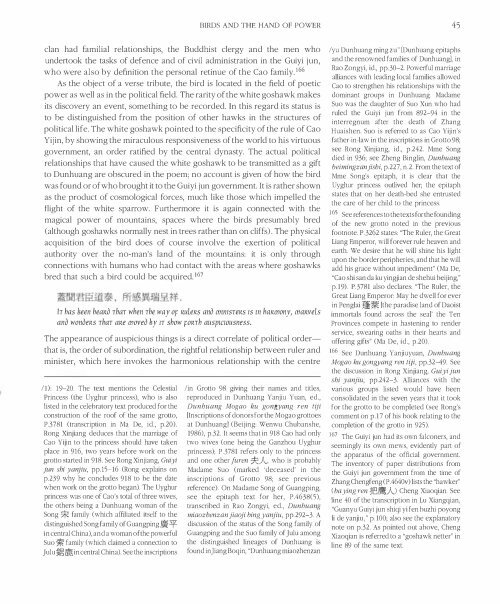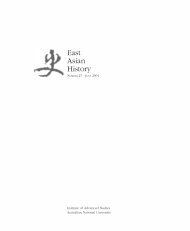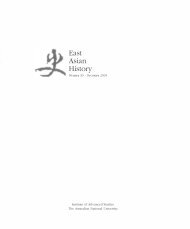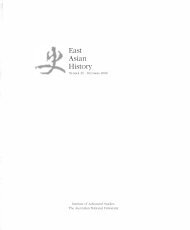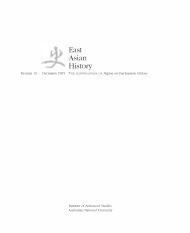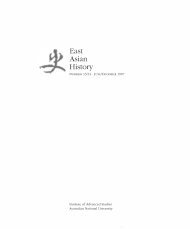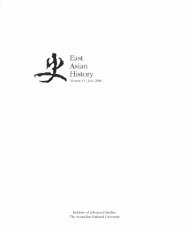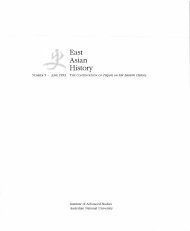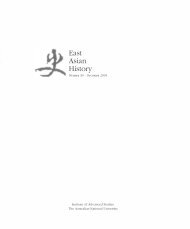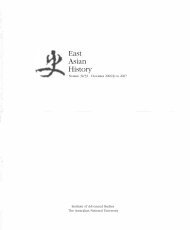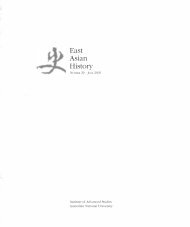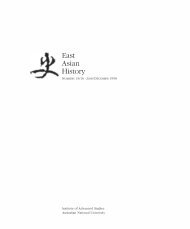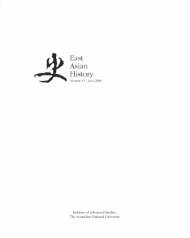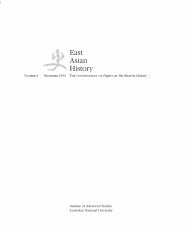East Asian History - ANU
East Asian History - ANU
East Asian History - ANU
- No tags were found...
You also want an ePaper? Increase the reach of your titles
YUMPU automatically turns print PDFs into web optimized ePapers that Google loves.
BIRDS AND THE HAND OF POWER45clan had familial relationships, the Buddhist clergy and the men whoundertook the tasks of defence and of civil administration in the Guiyi jun,who were also by definition the personal retinue of the Cao family. 166As the object of a verse tribute, the bird is located in the field of poeticpower as well as in the political field. The rarity of the white goshawk makesits discovery an event, something to be recorded. In this regard its status isto be distinguished from the position of other hawks in the structures ofpolitical life. The white goshawk pointed to the specificity of the rule of CaoYijin, by showing the miraculous responsiveness of the world to his virtuousgovernment, an order ratified by the central dynasty. The actual politicalrelationships that have caused the white goshawk to be transmitted as a giftto Dunhuang are obscured in the poem; no account is given of how the birdwas found or of who brought it to the Guiyi jun government. It is rather shownas the product of cosmological forces, much like those which impelled theflight of the white sparrow. Furthermore it is again connected with themagical power of mountains, spaces where the birds presumably bred(although goshawks normally nest in trees rather than on cliffs). The physicalacquisition of the bird does of course involve the exertion of politicalauthority over the no-man's land of the mountains: it is only throughconnections with humans who had contact with the areas where goshawksbred that such a bird could be acquired.167IT has heen heaRa ThaT when The way of RuLeRS ana mIn[STfRS [S In haRmony, maRveLsana wonaeRs ThaT aRe movea hy [T show FORTh ausp[c!Ousness.The appearance of auspicious things is a direct correlate of political orderthatis, the order of subordination, the rightful relationship between ruler andminister, which here invokes the harmonious relationship with the centreII): 19-20. The text mentions the CelestialPrincess (the Uyghur princess), who is alsolisted in the celebratory text produced for theconstruction of the roof of the same grotto,P.3781 (transcription in Ma De, id., p.20).Rong Xinjiang deduces that the marriage ofCao Yijin to the princess should have takenplace in 916, two years before work on thegrotto started in 918. See Rong Xinjiang, Guiyijun shi yanjiu, pp.l5-16 (Rong explains onp.239 why he concludes 918 to be the datewhen work on the grotto began). The Uyghurprincess was one of Cao's total of three wives,the others being a Dunhuang woman of theSong ,* family (which affiliated itself to thedistinguished Song family of Guangping!a'3fin central China), and a woman of the powerfulSuo *' family (which claimed a connection toJulu 1m in central China). See the inscriptionslin Grotto 98 giving their names and titles,reproduced in Dunhuang Yanjiu Yuan, ed.,Dunhuang Mogao ku gongyang ren fiji[Inscriptions of donors for the Mogao grottoesat Dunhuangl (Beijing: Wenwu Chubanshe,1986), p.32. It seems that in 918 Cao had onlytwo wives (one being the Ganzhou Uyghurprincess); P.3781 refers only to the princessand one other Juren x.A., who is probablyMadame Suo (marked 'deceased' in theinscriptions of Grotto 98; see previousreference). On Madame Song of Guangping,see the epitaph text for her, P.4638(5),transcribed in Rao Zongyi, ed., Dunhuangmiaozhenzan jiaoji bing yanjiu, pp.292-3. Adiscussion of the status of the Song family ofGuangping and the Suo family of Julu amongthe distinguished lineages of Dunhuang isfound inJiang Boqin, "Dunhuang miaozhenzanlyu Dunhuang ming zu" [Dunhuang epitaphsand the renowned families of Dunhuangl, inRao Zongyi, id., pp.30-2. Powerful marriagealliances with leading local families allowedCao to strengthen his relationships with thedominant groups in Dunhuang. MadameSuo was the daughter of Suo Xun who hadruled the Guiyi jun from 892-94 in theinterregnum after the death of ZhangHuaishen. Suo is referred to as Cao Yijin'sfather-in-law in the inscriptions in Grotto 98;see Rong Xinjiang, id., p.242. Mme Songdied in 936; see Zheng Binglin, Dunhuangbeimingzan jishi, p.227, n.2. From the text ofMme Song's epitaph, it is clear that theUyghur princess outlived her; the epitaphstates that on her death-bed she entrustedthe care of her child to the princess.165 See references to the texts for the foundingof the new grotto noted in the previousfootnote. P.3262 states: "The Ruler, the GreatLiang Emperor, will forever rule heaven andearth. We desire that he will shine his lightupon the border peripheries, and that he willadd his grace without impediment" (Ma De,"Cao shi san da ku yingjian de shehui beijing,"p.19). P.3781 also declares: "The Ruler, theGreat Liang Emperor: May he dwell for everin Penglai [the paradise land of Daoistimmortals found across the seal' the TenProvinces compete in hastening to renderservice, swearing oaths in their hearts andoffering gifts" (Ma De, id., p.20).166 See Dunhuang Yanjiuyuan, DunhuangMogao ku gongyang ren fiji, pp.32-49. Seethe discussion in Rong Xinjiang, Guiyi junshi yanjiu, pp.242-3. Alliances with thevarious groups listed would have beenconsolidated in the seven years that it tookfor the grotto to be completed (see Rong'scomment on p.17 of his book relating to thecompletion of the grotto in 925).167 The Guiyi jun had its own falconers, andseemingly its own mews, evidently part ofthe apparatus of the official government.The inventory of paper distributions fromthe Guiyi jun government from the time ofZhang Chengfeng (P. 4640v) lists the "hawker"(ba ying ren rel.l!)") Cheng Xiaoqian. Seeline 40 of the transcription in Lu Xiangqian,"Guanyu Guiyi jun shiqi yi fen buzhi poyongIi de yanjiu," p.100; also see the explanatorynote on p.32. As pointed out above, ChengXiaoqian is referred to a "goshawk netter" inline 89 of the same text.


